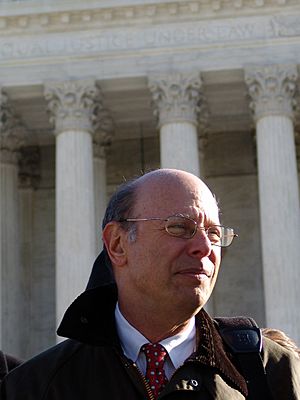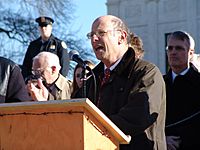Michael Ratner facts for kids
Quick facts for kids
Michael D. Ratner
|
|
|---|---|

At the U.S. Supreme Court
|
|
| Born | June 13, 1943 Cleveland, Ohio, U.S.
|
| Died | May 11, 2016 (aged 72) New York City, U.S.
|
| Education |
|
| Occupation | Attorney |
| Employer | Center for Constitutional Rights (CCR) |
| Organization | European Center for Constitutional and Human Rights (ECCHR) National Lawyers Guild (NLG) |
| Known for | Civil and human rights litigation and advocacy |
Michael Ratner (June 13, 1943 – May 11, 2016) was an American lawyer who spent his career fighting for human rights. He was known for leading the Center for Constitutional Rights (CCR), a group that uses lawsuits to protect people's rights. He also led the European Center for Constitutional and Human Rights (ECCHR) in Berlin.
One of his most famous cases was Rasul v. Bush. This was the first lawsuit to challenge how the U.S. government held people after the September 11 attacks. He helped represent people held at Guantanamo Bay. The United States Supreme Court agreed with him. They said that even at Guantanamo, people had the right to challenge their detention in U.S. courts. This was a big win for human rights.
Ratner was also a leader of the National Lawyers Guild (NLG). He wrote many books and articles about law and human rights. He even co-hosted a radio show called Law and Disorder. This show talked about new legal issues related to civil liberties (your basic freedoms) and human rights.
Michael Ratner had two siblings who were also well-known. His sister, Ellen Ratner, was a radio host. His brother, Bruce Ratner, was a real estate developer. Michael Ratner studied at Brandeis University and then went to Columbia Law School. He graduated at the top of his class.
Contents
Michael Ratner: Lawyer, Activist, Author
Michael Ratner was not just a lawyer; he was also a teacher, an activist, and an author. He used his skills to stand up for what he believed was right.
Teaching Law to Future Lawyers
In the early 1970s, Michael Ratner shared his legal knowledge. He taught law at important universities. These included Columbia Law School and Yale Law School.
Standing Up for What's Right
Michael Ratner was a strong activist. He spoke out against the Iraq War. He believed it was wrong.
Later in his life, he worked to defend Julian Assange and WikiLeaks. He also supported people like Jeremy Hammond and Chelsea Manning. These individuals were accused of sharing secret information. In 2013, Ratner appeared in a video supporting Chelsea Manning. Manning was facing a military trial for sharing files with WikiLeaks.
In 2014, Ratner resigned from a board at Brandeis University. He did this because the university cut ties with Al-Quds University, a Palestinian university. Ratner supported Al Quds' president, who promoted peace and respect between different groups.
Fighting for Civil Liberties and Human Rights
After the U.S. government started holding prisoners at Guantanamo Bay Naval Base in 2002, Ratner took action. The government claimed these prisoners were outside U.S. law. Ratner and other lawyers from the CCR disagreed.
They filed a major lawsuit called habeas corpus petitions. This type of petition asks a court to decide if someone is being held legally. They argued that holding people indefinitely without charges was unlawful. They lost in lower courts, but the United States Supreme Court agreed to hear their case in 2003.
The Supreme Court ruled in Rasul v. Bush (2004) that the prisoners at Guantanamo Bay had rights. This was because the base was seen as part of U.S. territory. This meant the prisoners could have lawyers and challenge their detention. The CCR helped many of these men get legal help. This led to hundreds of prisoners being released.
In 2007, Ratner filed a complaint in France. He asked for the criminal prosecution of US Secretary of Defense Donald Rumsfeld. This was for the alleged abuse of prisoners at Abu Ghraib prison in Iraq.
Ratner also helped Haitian President Jean-Bertrand Aristide. He assisted in prosecuting human rights crimes in Haiti. He even sued the U.S. government to try to stop wars. He won a case for victims of the Bosnian Serb leader, Radovan Karadžić, who committed war crimes. The Center for Constitutional Rights, which Ratner led, works to protect basic freedoms in the U.S.
Sharing Knowledge Through Books
Michael Ratner wrote many books and newspaper articles. He wrote about topics like the Patriot Act, military tribunals, and how civil liberties were restricted after 2001.
His writings are found in books like Disappeared in America and Freedom at Risk. He also wrote a textbook about a case involving Joel Filártiga. Filártiga was a Paraguayan who won a case in a U.S. court in 1984. This case set a new legal rule. It allowed people from other countries to sue for human rights abuses in U.S. courts. This rule is now used often.
His Life and Passing
Michael Ratner was born into a large Jewish family. His parents had left Poland to escape antisemitism. His parents spoke Yiddish at home and were religious.
Michael Ratner was married to Karen Ranucci. He passed away on May 11, 2016. His brother, Bruce Ratner, said that he died from complications related to cancer.
Awards and Recognition
Michael Ratner received many awards for his work. These awards recognized his dedication to human rights and justice:
- 2009: Courage of Conviction Award from the University of Iowa Center for Human Rights.
- 2008: William J. Butler Human Rights Medal for his leadership in defending prisoners at Guantanamo.
- 2007: Puffin/Nation Prize for Creative Citizenship.
- 2006: The National Law Journal named him one of the 100 most influential lawyers in the U.S.
- 2006: Honored as Trial Lawyer of the Year by Trial Lawyers for Public Justice.
- 2006: Brandeis University Alumni Achievement Award.
- 2006: Lennon Ono Peace Grant from Yoko Ono for the Center for Constitutional Rights.
- 2006: Winner of the Letelier-Moffit award and the NYC Jobs with Justice award.
- 2006: Hans Litten Prize, awarded in Berlin.
- 2005: The Columbia Law School Public Interest Law Foundation Award and the Columbia Law School Medal of Honor.
- 2005: Given the North Star Community Frederick Douglass Award.
- 2005: Made an Honorary Fellow at the University of Pennsylvania Law School.
- 2005: Marshall T. Meyer Risk-Taker Award.
Ratner was the President of the European Center for Constitutional and Human Rights in Berlin. He also served on the boards of several non-profit organizations. These included The Culture Project, The Brandeis Center for Ethics, Justice and Public Life, and The Real News (TRNN).
Books by Michael Ratner
- 1996: International Human Rights Litigation in U.S. Courts (with Beth Stephens)
- 1997: Che Guevara and the FBI: U.S. Political Police Dossier on the Latin American Revolutionary
- 2000: The Pinochet Papers: The Case of Augusto Pinochet in Spain and Britain (with Brody)
- 2003: Against War with Iraq: An Anti-War Primer (with Jennie Green and Barbara Olshansky)
- 2004: Guantanamo: What the World Should Know (with Ellen Ray)
- 2008: International Human Rights Litigation in U.S. Courts (with Beth Stephens, Judith Chomsky, Jennifer Green, Paul Hoffman)
- 2008: The Prosecution of Donald Rumsfeld: A Prosecution by Book
- 2011: Hell No: Your Right to Dissent in 21st-Century America (with Margaret Ratner Kunstler)
- 2021: Moving the Bar: My Life as a Radical Lawyer
 | George Robert Carruthers |
 | Patricia Bath |
 | Jan Ernst Matzeliger |
 | Alexander Miles |


